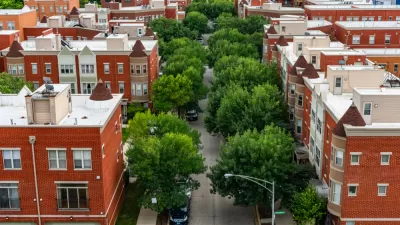Ending single-family zoning, as more cities around the United States have begun to do, is too extreme a response to contemporary planning challenges, according to a recent opinion piece published by the East Bay Times.

Pierluigi Olivero, a member of the San Jose Planning Commission and a former San Jose City Councilman, writes an opinion piece published by the East Bay Times that announces opposition to a wave of zoning reform efforts underway in the San Francisco Bay Area.
According to Olivero, the idea of ending single-family zoning is "extreme," and proponents are exaggerating the scale at which reforms are being adopted. "In reality, this type of policy has only moved forward in two places: Oregon (2019) and Minneapolis (2020)." Olivero is distinguishing between the step of approving a plan and the additional step of then implementing that plan. These examples of zoning reform's avant garde are further along in the process, and they have encountered challenges in the implementation step. Olivero mentions that Lake Oswego, Oregon has resisted the state preemption of single-family zoning by raising demolition fees, and the process of implementing the Minneapolis 2040 Comprehensive Plan has been rife with controversy and litigation.
By Planetizen's count, many other cities, counties, and states are taking substantive steps toward removing varying manifestations of single-family zoning, so focusing only on the two cities that have made the most progress in the zoning reform effort is probably also an exaggeration.
Olivero is writing to respond to a proposal to oppose a similar action in San José, expected for a City Council hearing in June. According to Olivero, the ordinance "would allow a single-family house on your block to be demolished, without a community meeting or public hearing, and replaced with up to six housing units." Olivero also announces that called Families and Homes San Jose has formed to oppose the potential zoning reforms. According to Olivero, the organization supports the city's current general plan and the addition of accessory dwelling units, but would prefer Urban Village plans "to expedite mixed-use development of underutilized/vacant shopping centers."
"Alternatively, we might consider a hyperlocal zoning option where residents could vote for specific zoning for their individual block," writes Olivero, echoing an idea recently examined in an article published by Bloomberg CityLab that shared news of a report published by the Manhattan Institute in February 2021.
For another approach to zoning reform skepticism, recall an article by Jason Segedy, published in June 2020, which suggests that zoning reform might not be effective in delivering the desired outcomes.
FULL STORY: Opinion: Let residents determine the fate of their own neighborhood

Maui's Vacation Rental Debate Turns Ugly
Verbal attacks, misinformation campaigns and fistfights plague a high-stakes debate to convert thousands of vacation rentals into long-term housing.

Planetizen Federal Action Tracker
A weekly monitor of how Trump’s orders and actions are impacting planners and planning in America.

In Urban Planning, AI Prompting Could be the New Design Thinking
Creativity has long been key to great urban design. What if we see AI as our new creative partner?

Pedestrian Deaths Drop, Remain Twice as High as in 2009
Fatalities declined by 4 percent in 2024, but the U.S. is still nowhere close to ‘Vision Zero.’

King County Supportive Housing Program Offers Hope for Unhoused Residents
The county is taking a ‘Housing First’ approach that prioritizes getting people into housing, then offering wraparound supportive services.

Researchers Use AI to Get Clearer Picture of US Housing
Analysts are using artificial intelligence to supercharge their research by allowing them to comb through data faster. Though these AI tools can be error prone, they save time and housing researchers are optimistic about the future.
Urban Design for Planners 1: Software Tools
This six-course series explores essential urban design concepts using open source software and equips planners with the tools they need to participate fully in the urban design process.
Planning for Universal Design
Learn the tools for implementing Universal Design in planning regulations.
planning NEXT
Appalachian Highlands Housing Partners
Mpact (founded as Rail~Volution)
City of Camden Redevelopment Agency
City of Astoria
City of Portland
City of Laramie





























